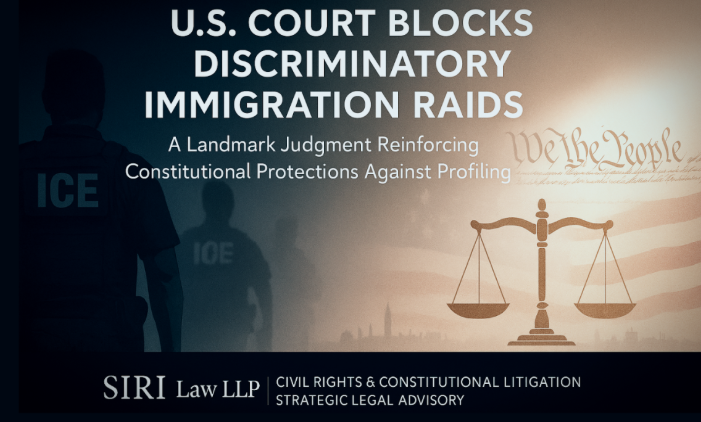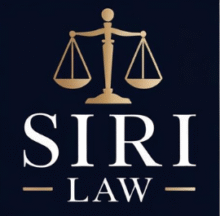
On July 12, 2025, the United States District Court for the Central District of California delivered a landmark ruling enjoining Immigration and Customs Enforcement (ICE) and Customs and Border Protection (CBP) from conducting immigration raids in Los Angeles County solely based on race, accent, or appearance. This article provides a thorough, professional analysis of this decision, exploring its constitutional underpinnings, procedural history, implications for enforcement strategy, and compliance guidance for organizations likely to interact with these legal issues.
It is intended to equip legal professionals, policy makers, public administrators, and corporate counsel with actionable insight into the ruling’s significance and its broader impact on governance and risk management.
The Constitutional Foundation
Fourth Amendment Principles
The Fourth Amendment protects individuals against unreasonable searches and seizures, requiring that government actions be justified by probable cause and executed reasonably. The seminal case Terry v. Ohio (1968) introduced the standard of “reasonable suspicion” as a threshold for brief investigative stops, while Whren v. United States (1996) affirmed that pretextual stops based on race are impermissible when lacking objective justification.
In the present case, plaintiffs alleged that ICE and CBP violated these principles by conducting mass apprehensions without articulable facts specific to individuals, relying instead on broad demographic indicators.
Equal Protection and Procedural Due Process
Although the Equal Protection Clause directly applies to state governments, the Fifth Amendment’s Due Process Clause has been interpreted to impose similar constraints on federal action (Bolling v. Sharpe, 1954). Targeting individuals based on race or national origin invokes “strict scrutiny,” the highest level of judicial review. Additionally, under Mathews v. Eldridge (1976), procedural due process requires that government actions affecting fundamental liberties balance private interests, risk of erroneous deprivation, and administrative burden.
The Case: Procedural History and Key Findings
In June 2025, a coalition of community organizations filed a class action lawsuit seeking to enjoin ICE and CBP from conducting raids without individualized suspicion. On June 30, plaintiffs moved for a Temporary Restraining Order (TRO), which Judge Margaret A. Nascimento granted, citing likely constitutional violations and irreparable harm.
On July 12, after evidentiary hearings and briefing, the court issued a preliminary injunction mandating Raids may not target individuals based solely on race, accent, or perceived nationality. All apprehensions must be predicated on reasonable suspicion supported by specific facts. Detainees must receive immediate notice of their right to legal counsel and access to communication with attorneys. ICE and CBP must publicly report, monthly, the demographics of apprehended individuals, reasons for detention, and counsel access compliance.
Implications for Immigration Enforcement
Operational Adjustments
Agencies are now compelled to adopt rigorous documentation protocols. Field officers must articulate and record facts justifying apprehension decisions. Training programs must be updated to reflect constitutional mandates, and internal audits will need to monitor compliance.
Impact on Affected Communities
The injunction offers meaningful protection to immigrant communities, fostering greater trust in public institutions and diminishing fear of arbitrary action. Legal support networks will face heightened demand as more individuals exercise their right to counsel.
Broader Precedents and National Context
The Los Angeles decision builds on a growing body of jurisprudence challenging discriminatory enforcement practices. Notable cases in New York and Arizona have similarly restricted local or federal agencies from employing race-based targeting without individualized evidence. These decisions collectively reinforce the judiciary’s critical oversight role in safeguarding constitutional norms against encroachment by enforcement agencies.
Compliance and Risk Management Strategies
For Government Agencies
- Review and amend interagency memoranda of understanding (MOUs) to reflect the injunction. Implement enhanced training curricula addressing Fourth and Fifth Amendment principles. Develop transparent reporting mechanisms to meet judicially mandated disclosure obligations. For Businesses and Nonprofits
- Audit employment verification (I‑9, E‑Verify) procedures to ensure nondiscriminatory compliance. Establish internal protocols for responding to enforcement inquiries in a manner that respects employee rights and complies with legal obligations. Engage counsel to design workplace training programs that educate management and staff on lawful interactions with enforcement officials. Litigation Readiness Corporate legal departments should prepare for possible litigation by preserving relevant records, identifying potential witnesses, and engaging experts who can attest to compliance efforts.
Conclusion
The July 12 ruling by the Central District of California reaffirms the vitality of constitutional protections in the context of immigration enforcement. By demanding individualized suspicion and prohibiting discriminatory profiling, the judiciary reinforced the foundational principle that liberty and justice are not contingent on appearance or accent.
Legal and compliance professionals must proactively adjust their strategies to reflect this evolving landscape – ensuring both adherence to constitutional requirements and the protection of organizational and individual interests.
About SIRI Law LLP
SIRI Law LLP is a Hyderabad-based full-service law firm offering strategic, solution-driven legal counsel. Our practice spans constitutional litigation, administrative law, immigration compliance, and civil rights advocacy. We serve clients across industries including technology, healthcare, education, public administration, and non-profit organizations.
At SIRI Law LLP, we provide comprehensive support to clients by Designing and auditing compliance frameworks aligned with constitutional standards.Offering litigation support and representation in constitutional and administrative law matters. Developing training modules for public and private sector organizations to mitigate legal risks and strengthen governance. Advising on policy formulation and implementation to ensure respect for civil rights and due process. Our team blends legal acumen with strategic insight to deliver tailored solutions that uphold rights, ensure resilience, and promote transparency.

